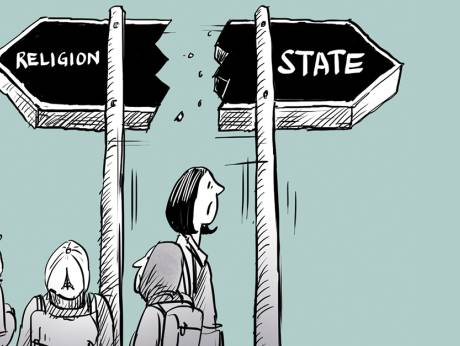Is Secularism Under Threat In India?
Secularism
as defined by the Cambridge English Dictionary is the belief that religion
should not be involved with the ordinary social and political activities of a
country. According to the Merriam-Webster dictionary, it is the
"indifference to, or rejection or exclusion of, religion and religious
considerations."
In the political context, secularism is the principle of separation of government
institutions and states from religious institutions and religious dignitaries.
That means the government should remain neutral on the matters of religion and
should not enforce nor prohibit the free exercise of religion, leaving religious
choice to the liberty of the people. In short, the state would not discriminate
against people based on religion.
Indian
secularism was not only a result of historical circumstances as a British
colony but also a necessity. India is a diverse country with people of almost
all major religions of the world (needless to mention that four major religions
have their origin on this land). This enormous diversity cannot be
straight-jacketed into a homogeneous culture. Perhaps the best way to celebrate
them is within a given space.
When
Indira Gandhi added the term secular in the Constitution through its 42nd
amendment in 1976, there was a furore among the Jan Sangh members, now the BJP.
While they opposed the inclusion of the term in the Constitution, they did it
subtly. The line of rationale put forward by Jan Sangh then was that the
Indian Constitution had always been secular since its inception. Therefore, the term
‘secular’ is redundant here.
The
Indian Constitution harboured secularism as a principle since its inception.
Article 25 guarantees the freedom to worship, profess, and propagate one’s
religion. But the irony is that the party that has always taken pride in
Indian secularism is up for burying it to attract the Hindutva vote. The
Citizen Amendment Bill proposed by the Central government is in gross violation
of the secular principle of the Constitution. No secular country should ever
give citizenship simply based on religion. This is beyond the comprehension
of any political theorist barring a few Hindutva brigades.
If
a nation wants to give citizenship to certain persecuted minorities from the
neighbouring countries then it should abolish the explicitly named religions.
Persecuted minorities should not be conditioned with Hindus Christians, etc.
On humanitarian grounds, they deserve shelter irrespective of their religion.
However,
this has been intentionally violated by the ruling dispensation. While the
Government wants to deport the persecuted minorities of the Rohingya community who
would face nothing but persecution if sent back to Myanmar, the same dispensation
was other sections to be welcomed as full-fledged citizens. Is it not
discrimination? Should one put it more blatantly: Is this because the Rohingyas
are Muslims and the persecuted minorities in Bangladesh, Pakistan, and
Afghanistan are mostly Hindus? Is the secular fabric still alive?
These
questions are legitimate and nobody can pretend to ignore the gravity of these
questions. The Supreme Court of India had in its judgments established that
secularism is a basic feature of the Indian Constitution and as such cannot be
violated even by amendment because the Constituent Assembly had assiduously
enshrined these principles. For any change in the basic structure, once again a
Constituent Assembly has to be formed with representatives of all the
stakeholders discussions and debates should take place and resolution
should be adopted after deliberations. That means for a change in the basic
structure, a similar process has to be followed.
It
is a moment that the apex court should take cognizance of the threat to the
very fundamental principle of Indian democracy- secularism. The court should
take cognizance, come forward, and exercise its power to shield the Constitution
from any possible violation. The apex court as the custodian of our
constitution is the last resort that we as common citizens can look forward to.




awesome write up bro..keep it up
ReplyDeleteThank you for the appreciation..
Delete